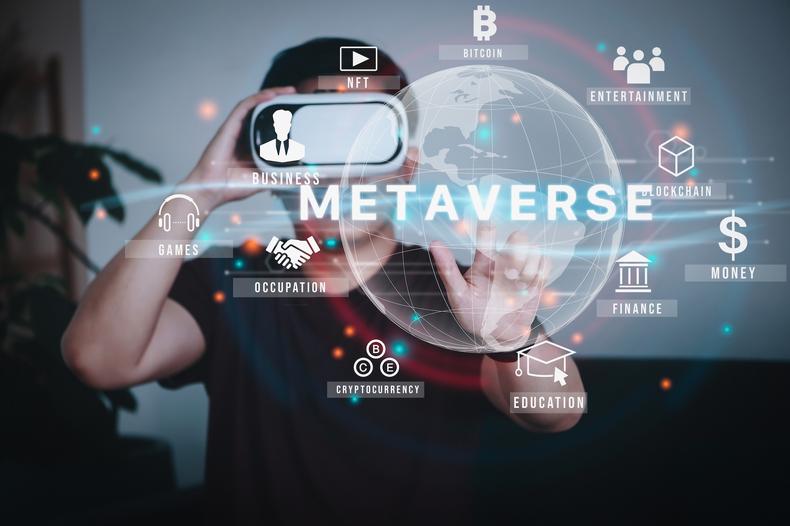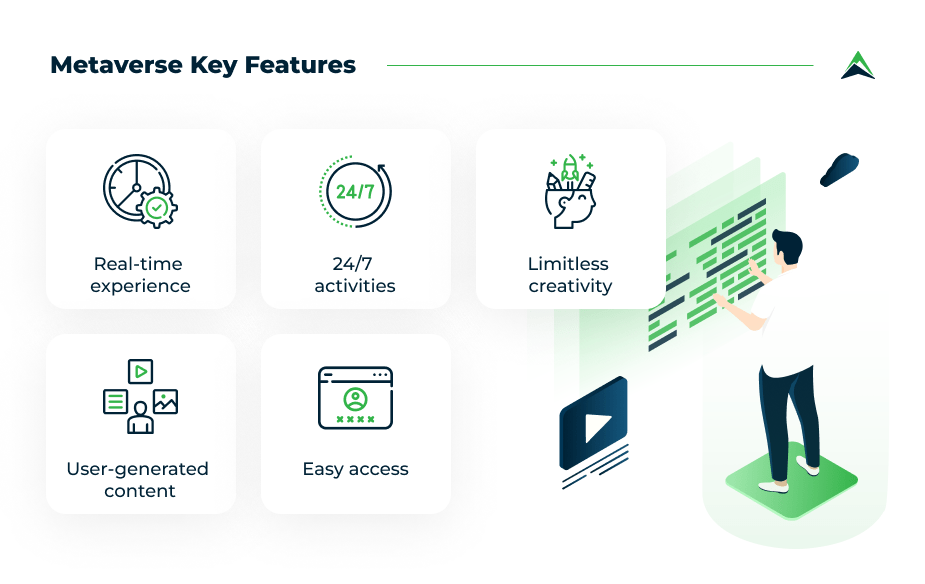The metaverse is more than just a buzzword; it’s a transformative shift in how brands and consumers interact. Metaverse marketing is an innovative approach that leverages virtual environments to create immersive brand experiences. As major tech companies invest in virtual reality (VR), augmented reality (AR), and blockchain technology, marketers are increasingly exploring ways to tap into this new realm. This article delves into the fundamentals of metaverse marketing, its benefits, challenges, and future potential.
We’ll cover how the metaverse reshapes brand-consumer interactions, practical strategies for marketers, and emerging trends you should watch. Let’s explore how the metaverse can elevate your marketing strategy.
What is Metaverse Marketing?
Metaverse marketing involves engaging audiences within immersive, 3D virtual environments. Unlike traditional digital marketing on social media or search engines, the metaverse offers a rich, interactive experience, where users can connect with brands in real-time through avatars, virtual worlds, and digital assets.

Key Features of Metaverse Marketing
- Immersive Experiences: Brands can create 3D spaces where users can experience products firsthand.
- Virtual Commerce: The metaverse allows for transactions, enabling users to buy digital or physical products directly from virtual stores.
- Blockchain Integration: NFTs (Non-Fungible Tokens) and cryptocurrencies play a crucial role in the ownership and transaction of virtual assets.
The metaverse blurs the lines between physical and digital worlds, offering marketers a chance to rethink how they engage with consumers.
Benefits of Metaverse Marketing
The metaverse presents unique opportunities for brands to build deeper connections with their audiences. Here are some of the top benefits:
Enhanced Customer Engagement
In the metaverse, consumers can interact with brands in new and engaging ways. Virtual events, product launches, and interactive experiences can captivate users far more than traditional media.
Global Reach
The virtual nature of the metaverse removes geographical barriers, allowing brands to reach a global audience seamlessly. Anyone with internet access can participate in a brand’s virtual world.

Personalized Experiences
Through avatars and personalized environments, brands can deliver customized experiences that appeal directly to individual preferences. This level of personalization can significantly enhance brand loyalty.
New Revenue Streams
Metaverse marketing introduces new revenue models through virtual goods, NFTs, and brand collaborations in virtual worlds. Brands can monetize by selling digital versions of their products or creating exclusive virtual items.
How Brands are Using the Metaverse
Many forward-thinking brands have already begun exploring the potential of the metaverse for their marketing strategies.
Virtual Stores and Showrooms
Retail giants like Nike and Gucci have opened virtual stores in metaverse platforms like Roblox and Decentraland. These digital spaces allow users to explore products, try them on using avatars, and even make purchases.

Virtual Events and Concerts
Brands like Fortnite have hosted virtual concerts featuring major artists like Travis Scott, attracting millions of participants. These events blend entertainment and commerce, offering sponsorship opportunities and branded merchandise.

Branded Virtual Worlds
Companies like Coca-Cola are building entire virtual worlds where users can engage with the brand on a deeper level. These virtual environments create unique opportunities for storytelling, brand engagement, and advertising.
Challenges of Metaverse Marketing
While metaverse marketing offers incredible potential, it also comes with its challenges.
High Entry Costs
Developing an immersive 3D environment requires significant investment in technology, design, and development. Smaller businesses may find the cost of entry prohibitive.

Technological Barriers
Not all consumers have access to the necessary hardware like VR headsets or fast internet to fully experience the metaverse. This limits the reach to more tech-savvy or affluent audiences.
Data Privacy Concerns
The collection of user data in the metaverse raises concerns about privacy and security. Brands must navigate complex regulations to ensure compliance with data protection laws.
Best Practices for Metaverse Marketing
To succeed in the metaverse, marketers need to adopt new strategies and approaches.
Focus on User Experience
Creating a seamless, engaging user experience is crucial. The metaverse should be an extension of your brand, offering immersive and interactive elements that go beyond traditional marketing.
Collaborate with Influencers
Just like social media, influencers play a key role in the metaverse. Partnering with virtual influencers or celebrities can help you tap into larger, engaged audiences.
Leverage NFTs
Non-fungible tokens (NFTs) are a growing trend in the metaverse. Offering exclusive NFTs tied to your brand can drive user interest and create new revenue streams.

Future of Metaverse Marketing
The future of metaverse marketing looks promising, with rapid advancements in technology shaping new possibilities.
Increased Adoption of AR and VR
As VR and AR technologies become more accessible, expect more brands to adopt metaverse strategies. These technologies will likely become integral to both online and offline marketing campaigns.
Integration with Web 3.0
With the rise of Web 3.0, decentralized platforms are likely to play a critical role in the evolution of the metaverse. Blockchain technology will enable more secure, transparent, and user-owned experiences, changing the dynamics of digital marketing.
Brands as Content Creators
In the metaverse, brands will no longer be just advertisers; they will become content creators. From virtual games to branded experiences, companies will need to create engaging, immersive content to capture consumer attention.
Practical Applications of Metaverse Marketing
Here’s how you can start incorporating metaverse strategies into your marketing today:
Start Small
Begin by experimenting with existing platforms like Roblox, Decentraland, or Sandbox. Launching a small-scale virtual store or event can give you valuable insights without overwhelming your budget.
Create Engaging Virtual Events
Host a product launch, webinar, or virtual meetup in the metaverse. Use these events to interact with your audience in real-time, offering exclusive content or promotions.

Explore Virtual Sponsorships
Brands can sponsor events, experiences, or virtual products within the metaverse. Look for opportunities to place your brand in virtual concerts, art exhibitions, or games.
Conclusion
Metaverse marketing represents the future of brand engagement, offering unparalleled opportunities for immersive experiences, global reach, and personalized interactions. While challenges like high costs and technological barriers exist, forward-thinking brands are already exploring ways to engage consumers in virtual worlds.
As the technology continues to evolve, the metaverse will undoubtedly become a critical component of any successful marketing strategy. Now is the time for brands to start experimenting and building their presence in this emerging digital space.
FAQs
Q1. What is metaverse marketing?
Metaverse marketing involves engaging consumers within virtual 3D environments, offering immersive and interactive brand experiences.
Q2. Which brands are using metaverse marketing?
Brands like Nike, Gucci, and Coca-Cola are leveraging metaverse platforms for virtual stores, branded experiences, and virtual events.
Q3. What are the benefits of metaverse marketing?
Benefits include enhanced customer engagement, global reach, personalized experiences, and new revenue streams.
Q4. What challenges does metaverse marketing face?
High entry costs, technological barriers, and data privacy concerns are some challenges facing metaverse marketing.
Q5. How can I start with metaverse marketing?
You can begin by experimenting with existing metaverse platforms, hosting virtual events, and exploring virtual sponsorship opportunities.








